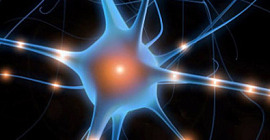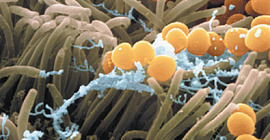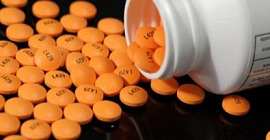A single dose of an experimental gene therapy boosted production of a missing blood-clotting factor in people with hemophilia, a new study shows. The therapy might give patients a long-term solution for preventing dangerous bleeding episodes.
Hemophilia is a rare, inherited disorder in which blood is unable to clot normally. As a result, people with hemophilia tend to bleed more than others after injury. They may also bleed without warning inside their bodies. This bleeding can damage organs and tissues and may be life threatening.
The main treatment, called replacement therapy, involves infusing missing clotting factor proteins into the patient's bloodstream. These proteins help to restore normal blood clotting. But replacement therapy often must be repeated regularly, and it carries other risks.
To find an alternative, researchers from the University College London and St. Jude Children's Research Hospital led a team that investigated a potential gene therapy approach. The research, funded in part by NIH's National Heart, Lung and Blood Institute (NHLBI), focused on hemophilia B. This uncommon form of the disease affects about 1 in 5 patients with hemophilia. Hemophilia B is caused by defects in the gene that codes for human clotting factor IX.
Scientists packaged a normal factor IX gene into a modified adeno-associated virus that targets liver cells. The liver is the only site that can produce a form of factor IX needed for the clotting process. The virus—acting as a delivery vehicle, or vector—was designed to transport the normal gene into liver cells and launch production of factor IX.
Get The Latest By Email
6 men with severe hemophilia B received one-time intravenous infusions of the gene vector at varying doses. Prior to the study, the men were producing clotting factor IX at less than 1% of normal levels. They had been receiving the standard treatment for their condition: infusions of manufactured factor IX protein several times a month.
After gene therapy, each patient generated factor IX at between 2% and 11% of normal levels. In the short-term follow-up period (6 to 16 months), 4 of the 6 men no longer needed factor IX infusions for routine bleeding.
Hemophilia has long been one of the disorders thought most likely to be correctible with gene therapy, but previous approaches to deliver the gene have been disappointing,” says NHLBI Acting Director Dr. Susan B. Shurin. Results from this study represent a promising step toward making gene therapy a viable treatment option for hemophilia B. If future studies support these findings, it would bring a significant improvement in the quality of life for those living with the disease.
- What is Hemophilia?
http://www. nhlbi. nih.
http://ghr. nlm. nih.
http://clinicaltrials. gov/ct2/show/NCT00979238?
Article Source:
http://www.nih.gov/researchmatters/december2011/12192011hemophilia.htm










